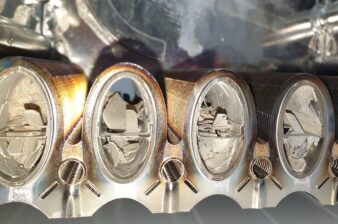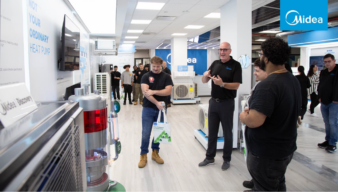- Honeywell’s Solstice® N41 (R-466A) is the industry’s first reduced global warming, non-flammable alternative refrigerant to R-410A, which is commonly used in home air-conditioning units
- Commercial and residential locations are participating in nationwide field trials without significant disruption to their existing infrastructures
Honeywell (Nasdaq: HON) has announced it will partner with Trane Technologies (NYSE: TT) to accelerate the transition to a next-generation, environmentally preferable refrigerant by field testing Honeywell’s Solstice® N41 (R-466A), the industry’s first nonflammable alternative to R-410A.
Trane will deploy and test Solstice N41 at three customer locations in different parts of the United States as part of a one-year field trial. Trane is currently testing Solstice N41 at the Western Cooling Efficiency Center (WCEC) at the University of California, Davis, to evaluate its performance with a Trane rooftop HVAC unit used in light commercial applications. The trials will test compatibility with new equipment installations and retrofit conversions. Trane will closely monitor power and energy consumption and analyze the refrigerant characteristics to further assess Solstice N41 as a replacement for R-410A.
“As a global climate innovator who is leading the industry transition to next-generation refrigerants, we have invested more than $500 million to identify safe, sustainable options,” said Randy Newton, vice president of engineering at Trane Technologies. “Our continuous testing, research and development supports new technologies that improve the carbon footprint in support of our customers’ needs and contribute to our Gigaton Challenge. As we evaluate refrigerants to replace R-410A, we seek to balance environmental impact, safety, efficiency, and affordability. We look forward to working with Honeywell to assess the feasibility of Solstice N41 as a safe option for the industry that could enable ease of transition to meet regulatory deadlines and help our customers meet their overall sustainability goals.”
Solstice N41 provides the same level of safety to contractors and customers as the market standard refrigerant, R-410A, and reduces global warming impact by 65 percent. Other alternatives proposed as R-410A replacements, such as R-32 and R-454B, are higher risk due to their 2L (low flammability) rating, which could increase risk to businesses and homeowners and require changes to safety standards and building codes and OEM equipment production lines.
“Honeywell scientists devoted years of research and development to develop a nonflammable product that can replace R-410A in homes and small business as a near drop-in replacement within existing infrastructures, while providing reduced global warming potential coupled with similar energy efficiency,” said Ken West, vice president and general manager, Honeywell Fluorine Products. “Solstice N41 is a great option for both commercial and residential end users. This next step with Trane solidifies our confidence in moving toward industry adoption of R-466A.”
“Our work is increasingly focused on recognizing the far-reaching implications of greenhouse gas emissions on our environment and changing climate,” said Curtis Harrington, senior engineer at U.C. Davis WCEC. “Our research with Trane allows us to provide an objective technology evaluation of Honeywell’s Solstice N41 field performance and provide valuable input on the development of next-generation refrigerants.”
To date, Solstice N41 has undergone extensive analysis by over 15 original equipment manufacturers (OEMs) and leading compressor manufacturers. The product has accumulated more than 100,000 reliable hours in different applications like commercial air conditioning (variable refrigerant flow, rooftops) and residential air conditioning (unitary ducted equipment in the U.S.).
Honeywell is a world leader in the development, manufacture and supply of refrigerants that are sold worldwide under the Solstice® and Genetron® brand names for a range of applications, including refrigeration and building and automobile air conditioning. Honeywell and its suppliers have completed a billion dollar investment program in research and development and new capacity based on Honeywell’s hydrofluorolefin technology. Worldwide adoption of Solstice products has resulted in the reduction of more than 200 million metric tons of greenhouse gases to date, equal to eliminating emissions from more than 42 million cars for one year.
Honeywell recently committed to achieve carbon neutrality in its operations and facilities by 2035. This commitment builds on the company’s track record of sharply reducing the greenhouse gas intensity of its operations and facilities as well as its decades-long history of innovation to help its customers meet their environmental and social goals. About half of Honeywell’s new product introduction research and development investment is directed toward products that improve environmental and social outcomes for customers.




Join the conversation: